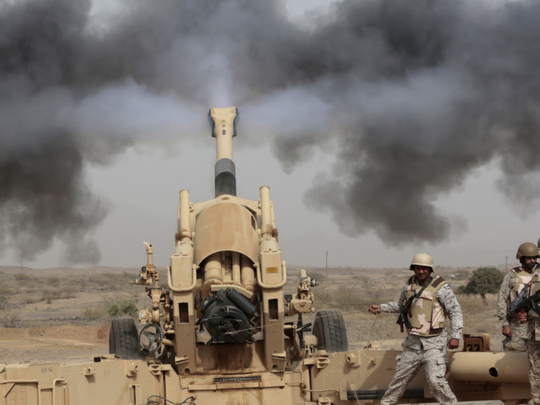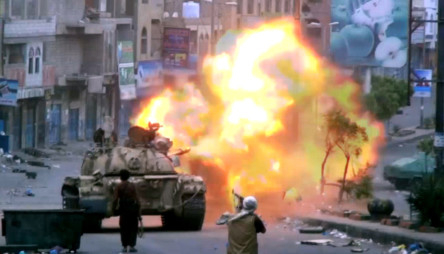
Riyadh: Saudi Arabia’s King Salman on Tuesday ordered the Saudi Arabian National Guard, widely regarded as the kingdom’s best equipped military ground force, to take part in Riyadh’s campaign against Iran-allied Al Houthi rebels in Yemen.
Military operations in the campaign have so far been carried out by the Royal Saudi Air Force and the Royal Saudi Land Forces, which answer to the Defence Ministry. The national guard is a separate military structure run by its own ministry.
The Saudi-led coalition on Tuesday pounded the Al Houthi militia in Yemen. The campaign is aimed at crushing the militia group that has over Sana’a and areas in northern Yemen and has been pressing an offensive to expand its gains in the rest of the country, including the southern port city of Aden.
On Tuesday, air strikes hit a gathering of Al Houthis in the western of Ibb, killing 20 fighters, security officials on the ground said. The rebels were assembling to head to Aden as reinforcements in the battle against forces loyal to President Abd Rabbo Mansour Hadi, who fled the country from Aden to Saudi Arabia last month.
In Sana’a, death toll from of bombings Monday targeting rebel depots and weapon caches in the Fag Atan mountains overlooking the city rose to 38, medical officials said. The bombings flattened houses and sent villagers fleeing for their lives.
The rebel-controlled Interior Ministry said 84 people were killed across the country in Monday’s air strikes.
The World Health Organisation said that the violence in Yemen has killed 944 people and injured 3,487 as of April 17.
The UN health agency said the numbers came from health facilities in Yemen, but the true figures are likely higher since many people are not making it to hospitals for treatment.
The WHO toll does not distinguish between civilians and fighters.
It also warned that health services in the country are on the brink of collapse amid critical shortages of life-saving medicines, oxygen and fuel.
Prices of essential medicines have increased by more than 300 per cent, and the shortage of water has increased the risk of diarrhoea and other diseases and is affecting basic hygiene in hospitals and clinics, the Geneva-based organisation said.
“Over the past four weeks, national disease surveillance reports show a doubling in the number of cases of bloody diarrhoea in children below the age of five, as well as an increase in the number of cases of measles and suspected malaria,” WHO Yemen representative Ahmad Shadoul said in a statement.
“High rates of malnutrition among women and children below the age of five have also been reported.” Major hospitals will soon be unable to provide emergency services, perform operations and provide intensive care to patients because of lack of medicines and fuel, WHO said, citing the Yemeni Ministry of Public Health and Population.
Al Thawrah, Yemen’s largest hospital with 850 patients, is at immediate risk of becoming unable to function because of critical shortages of fuel and oxygen, according to the UN Office for the Coordination of Humanitarian Affairs.
Fuel shortages have disrupted ambulance services and delivery of health supplies across the country, while laboratory and blood transfusion services face disruption from power cuts, WHO said.
There has been a 40 per cent drop in the number of consultations in health facilities since fighting in the country worsened, indicating that street fighting and road barriers are preventing ill people from reach facilities, WHO said.













